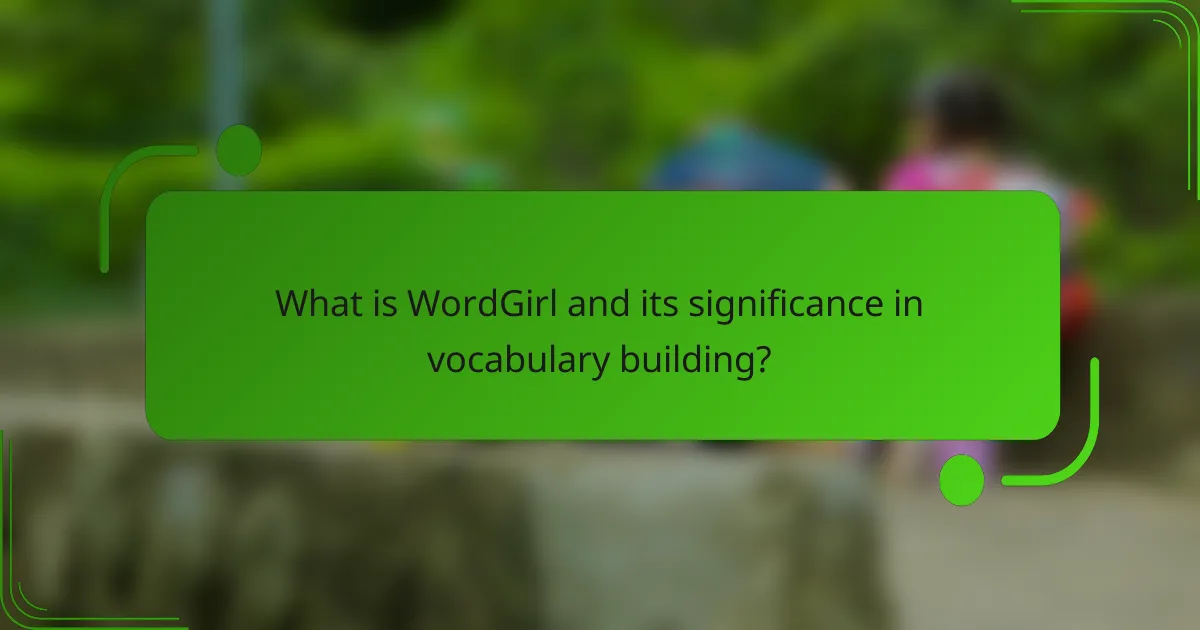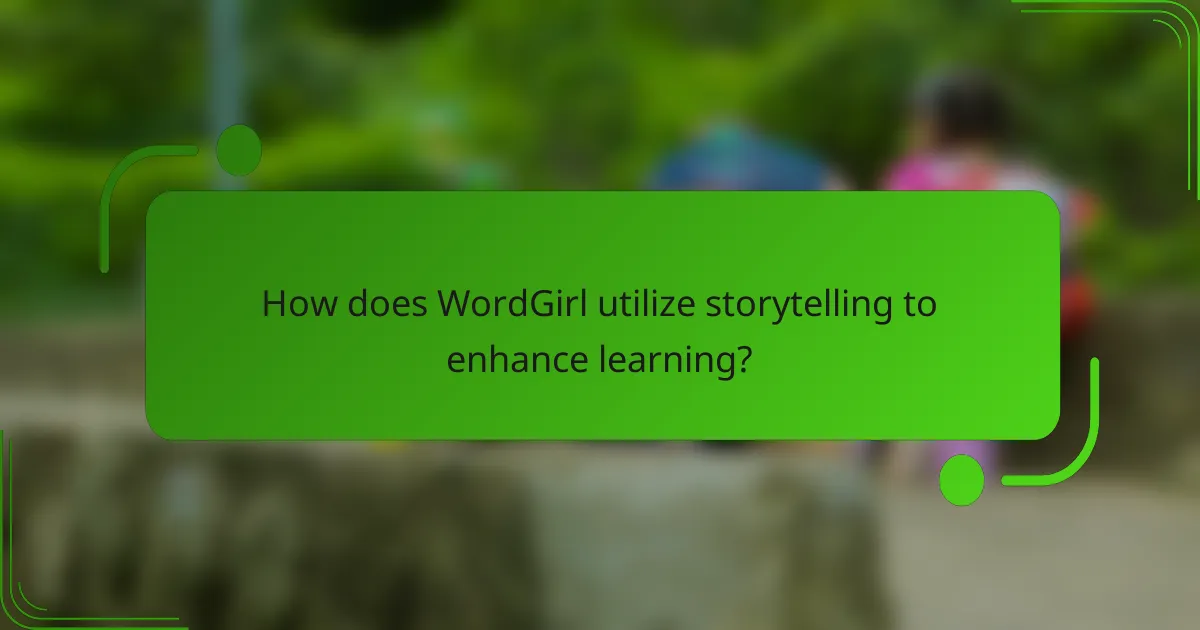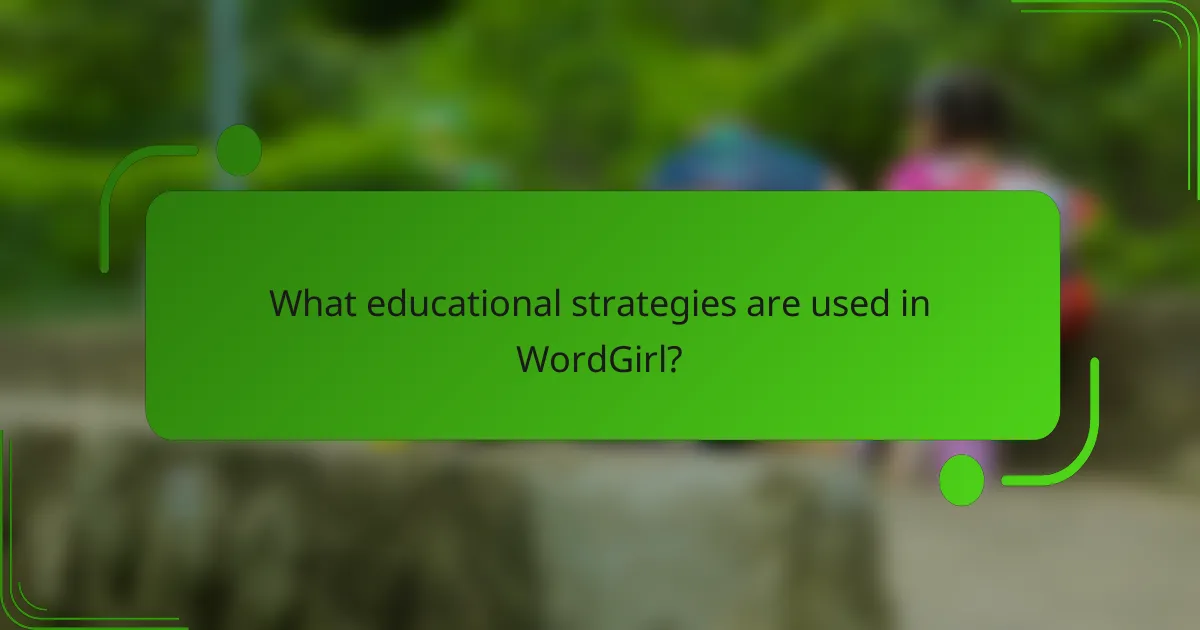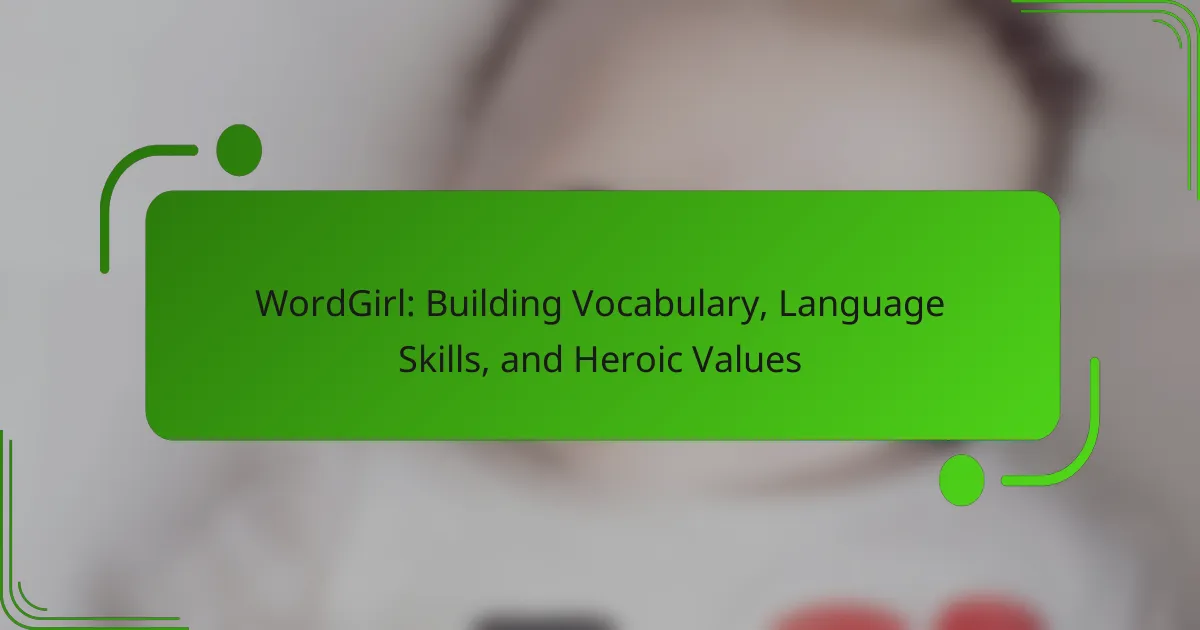WordGirl is an animated television series designed to enhance vocabulary and language skills among children. The show features a young superhero who battles villains using her extensive vocabulary, introducing new words and their meanings within engaging narratives. Each episode employs storytelling techniques that promote language acquisition through context and repetition, encouraging viewers to expand their vocabulary. Educational strategies integrated into the show, such as modeling effective communication and interactive elements, have been praised for their effectiveness in promoting literacy skills in young audiences. The combination of entertainment and educational content positions WordGirl as a valuable resource for language development.

What is WordGirl and its significance in vocabulary building?
WordGirl is an animated television series focused on a young superhero with a passion for words. The show aims to enhance vocabulary and language skills among children. It features WordGirl battling villains using her extensive vocabulary. Each episode introduces new words and their meanings in engaging contexts. This approach helps children learn and retain vocabulary through storytelling. Research indicates that vocabulary exposure improves reading comprehension and academic performance. WordGirl effectively combines entertainment with educational content to promote language development.
How does WordGirl contribute to language skills development?
WordGirl contributes to language skills development by introducing new vocabulary through engaging storytelling. The show’s dialogue features diverse words in context, making them easier for children to understand. Each episode emphasizes word meanings and usage, encouraging viewers to expand their vocabulary. WordGirl often defines words directly, reinforcing comprehension. The character’s adventures also stimulate interest in language and communication. Educational research indicates that exposure to rich language can enhance children’s linguistic abilities. Studies show that programs like WordGirl can improve vocabulary acquisition in young audiences.
What are the key features of WordGirl that enhance vocabulary?
WordGirl enhances vocabulary through engaging storytelling, character interactions, and vocabulary-focused episodes. The show features a superhero who uses advanced words in context. This context helps viewers understand and remember new vocabulary. Each episode introduces specific words and their meanings. WordGirl often encourages viewers to use these words in their daily lives. The character also models effective communication and word usage. Educational segments reinforce vocabulary lessons. Overall, WordGirl combines entertainment with educational value to enhance language skills.
How does WordGirl engage children in learning new words?
WordGirl engages children in learning new words through entertaining storytelling and character interactions. The show features WordGirl, a superhero who uses her vocabulary to combat villains. Each episode introduces new words and their meanings in context. Children see how WordGirl applies these words in dialogue and action. This contextual learning helps reinforce vocabulary retention. Additionally, the show’s playful tone and humor make learning enjoyable. Interactive elements in the series encourage viewers to think critically about language. Educational segments often summarize the new words learned, enhancing comprehension. Overall, WordGirl effectively combines entertainment with vocabulary education.
What heroic values does WordGirl promote?
WordGirl promotes values such as bravery, kindness, and the importance of education. The character exemplifies courage by standing up against villains. She demonstrates kindness through her interactions with others, helping those in need. Education is highlighted as she often uses her vocabulary skills to solve problems. WordGirl encourages critical thinking and communication. The show illustrates that using words wisely can lead to positive outcomes. Overall, these values are integral to her character and storyline.
How does WordGirl exemplify courage and determination?
WordGirl exemplifies courage and determination through her consistent battles against villains. She confronts challenges head-on, often facing formidable foes. Her bravery is evident when she stands up for justice, protecting her city and friends. WordGirl demonstrates determination by never giving up, even in the face of adversity. She uses her intelligence and vocabulary skills to outsmart her opponents. This combination of bravery and resolve inspires viewers to embrace similar values. Each episode showcases her commitment to doing what is right, reinforcing the importance of courage and determination in overcoming obstacles.
In what ways does WordGirl teach the importance of kindness and teamwork?
WordGirl teaches the importance of kindness and teamwork through various episodes that emphasize collaboration and empathy. Characters often face challenges that require them to work together to overcome obstacles. For instance, WordGirl frequently collaborates with her sidekick, Captain Huggy Face, demonstrating the power of teamwork. The show also highlights instances where characters help one another, reinforcing the value of kindness. Additionally, WordGirl confronts villains not just with strength but also by encouraging them to be better, showcasing her commitment to kindness. These narratives provide concrete examples of how teamwork and kindness lead to positive outcomes.

How does WordGirl utilize storytelling to enhance learning?
WordGirl utilizes storytelling to enhance learning by incorporating vocabulary-rich narratives. The show presents engaging plots that require problem-solving and critical thinking. Each episode features WordGirl using her superpowers to tackle challenges. This approach promotes language acquisition through context and repetition. Characters often use new words in relatable situations. Viewers are encouraged to expand their vocabulary alongside the characters. Research indicates that storytelling aids memory retention and comprehension. This method effectively combines entertainment with educational value.
What role does character development play in WordGirl?
Character development in WordGirl is crucial for illustrating moral lessons and enhancing viewer engagement. The show’s characters evolve through their experiences, showcasing growth and learning. For instance, WordGirl learns the importance of teamwork and empathy. Villains like Chuck the Evil Sandwich-Making Guy also experience changes, adding depth to their personalities. This development keeps the narrative dynamic and relatable for young audiences. Additionally, character arcs contribute to vocabulary building by presenting new words in context. Overall, character development enriches the storytelling and reinforces the show’s educational goals.
How do the villains in WordGirl contribute to vocabulary lessons?
The villains in WordGirl contribute to vocabulary lessons by using complex language and challenging words. Each villain often employs unique terms that are central to their schemes. This encourages viewers to learn and understand new vocabulary. For example, villains like Mr. Big use words related to their criminal activities. This context helps to reinforce the meanings of these words. The show’s narrative structure often requires characters to explain or clarify these terms. This further aids comprehension and retention for young audiences. Ultimately, the villains serve as tools for vocabulary enrichment in an engaging manner.
What are some memorable storylines that reinforce language skills?
WordGirl features memorable storylines that reinforce language skills through engaging narratives. One storyline involves WordGirl using her vocabulary to defeat villains. Each episode introduces new words and their meanings. For example, in “The Rise of Miss Power,” WordGirl teaches the importance of teamwork and communication. Another storyline showcases WordGirl’s interactions with her sidekick, Captain Huggy Face. Their dialogues emphasize word usage in context. Episodes often include vocabulary challenges that encourage audience participation. The show’s educational approach is backed by research from the National Association for the Education of Young Children. They highlight storytelling as a key method for language development.
How does WordGirl engage with its audience through interactive elements?
WordGirl engages with its audience through various interactive elements designed to enhance viewer participation. The show includes quizzes and vocabulary challenges that prompt audience responses. Viewers are encouraged to think critically about language and word usage. Interactive games on the official website reinforce the vocabulary introduced in episodes. These elements help solidify learning by making it fun and engaging. Additionally, WordGirl often breaks the fourth wall, inviting viewers to join in on problem-solving. This approach fosters a sense of connection and involvement with the characters. Overall, these interactive strategies effectively promote language skills and vocabulary development.
What types of games and activities are featured in WordGirl?
WordGirl features a variety of interactive games and activities designed to enhance vocabulary and language skills. These include word puzzles, spelling challenges, and vocabulary quizzes. The activities often involve characters from the show, making them engaging for children. Players can also participate in mini-games that require using words in context. Each game is structured to reinforce learning through fun and play. The activities are accessible on the show’s official website and educational platforms. These interactive elements align with the show’s educational goals of promoting literacy and language development.
How do these interactive elements support vocabulary retention?
Interactive elements enhance vocabulary retention by engaging learners actively in the learning process. These elements, such as games and quizzes, promote repetition and reinforcement of new words. Active participation helps solidify connections between words and their meanings. Research shows that interactive learning can improve recall by up to 50%. Additionally, these elements provide immediate feedback, allowing learners to correct mistakes and reinforce correct usage. This instant reinforcement aids memory retention. Overall, the combination of engagement, repetition, and feedback makes interactive elements effective for vocabulary retention.

What educational strategies are used in WordGirl?
WordGirl employs various educational strategies to enhance vocabulary and language skills. The show integrates new vocabulary words into engaging storylines. Each episode features a specific word, often defined and used in context. This repetition reinforces understanding and retention. Characters model appropriate language use, demonstrating effective communication. Interactive elements encourage viewer participation, prompting children to use new words. The narrative structure helps contextualize vocabulary in relatable scenarios. Educational experts have praised these methods for promoting literacy skills in young audiences.
How does WordGirl incorporate humor and fun into learning?
WordGirl incorporates humor and fun into learning by using comedic situations and clever wordplay. The show’s characters often engage in humorous banter that entertains while teaching vocabulary. For example, WordGirl’s battles against villains include playful dialogue filled with puns and witty remarks. These elements make language learning enjoyable for young viewers. Additionally, the show’s scenarios often involve silly misunderstandings that arise from vocabulary usage. This approach not only captivates the audience but also reinforces language concepts in a memorable way. The blend of action and humor keeps children engaged and motivated to learn.
What techniques does WordGirl use to make learning enjoyable?
WordGirl uses interactive storytelling to make learning enjoyable. She engages viewers with entertaining plots that incorporate vocabulary lessons. Each episode features her battling villains while introducing new words. WordGirl often explains the meanings of these words during her adventures. This method reinforces learning through context and repetition. Additionally, she encourages audience participation, prompting viewers to guess meanings. The show’s humor and relatable characters enhance engagement. Research indicates that interactive learning increases retention and enjoyment in educational content.
How does humor aid in vocabulary acquisition in children?
Humor aids in vocabulary acquisition in children by making learning enjoyable and engaging. When children encounter humorous content, they are more likely to pay attention and remember new words. Humor often involves wordplay, which can introduce children to multiple meanings and contexts of words. This exposure enhances their understanding and retention of vocabulary. Studies show that laughter releases dopamine, a neurotransmitter that promotes learning and memory. Additionally, humorous contexts provide memorable scenarios that help children associate new vocabulary with specific situations. This association further solidifies their grasp of the words. Overall, humor serves as a powerful tool in making vocabulary learning effective and fun for children.
What resources are available for parents and educators using WordGirl?
Parents and educators using WordGirl have access to various resources designed to enhance vocabulary and language skills. The official PBS Kids website offers interactive games and activities that reinforce the show’s educational content. Printable lesson plans and activity guides are available, providing structured ways to integrate WordGirl into classroom settings. Additionally, there are vocabulary lists and word games that align with episodes, promoting engagement and learning. These resources support the show’s mission to build language skills while emphasizing heroic values.
How can parents support their children’s vocabulary growth alongside WordGirl?
Parents can support their children’s vocabulary growth alongside WordGirl by engaging in interactive discussions about the show’s content. They should encourage children to use new words introduced in episodes. Reading books that include similar vocabulary can reinforce learning. Parents can also play vocabulary games that relate to WordGirl themes. Asking open-ended questions about the episodes helps children articulate their thoughts. Additionally, incorporating new words into daily conversations makes them more familiar. Using WordGirl’s online resources can provide further vocabulary practice. Consistent reinforcement of vocabulary helps solidify children’s understanding and usage.
What educational materials complement the WordGirl experience?
Educational materials that complement the WordGirl experience include vocabulary-building workbooks and interactive language games. These resources enhance the show’s focus on vocabulary and language skills. Additionally, storybooks featuring WordGirl can reinforce the lessons learned in episodes. Activities such as word puzzles and flashcards can further engage children in learning new words. Educational websites and apps that focus on language development also align well with the WordGirl curriculum. These materials collectively support the show’s goal of fostering language skills and heroic values in young viewers.
What tips can enhance the WordGirl learning experience?
Engaging with WordGirl can enhance the learning experience significantly. Watching episodes regularly helps reinforce vocabulary and language skills. Participating in discussions about the episodes encourages critical thinking. Using WordGirl-related games and activities makes learning fun and interactive. Reading books that complement the show’s themes expands vocabulary further. Practicing new words in everyday conversations solidifies understanding. Creating vocabulary flashcards aids in retention of new terms. Lastly, involving peers in group activities fosters a collaborative learning environment.
WordGirl is an animated television series designed to enhance children’s vocabulary and language skills through engaging storytelling and character interactions. The show features a young superhero who battles villains using her extensive vocabulary, introducing new words and their meanings in context. Key themes include the promotion of heroic values such as bravery, kindness, and teamwork, while educational strategies like interactive elements and humor make learning enjoyable. The article explores how WordGirl effectively combines entertainment with educational content, offering resources for parents and educators to support children’s vocabulary growth.
